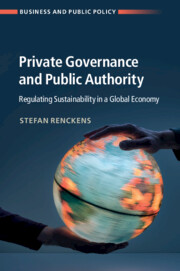Crossref Citations
This Book has been
cited by the following publications. This list is generated based on data provided by Crossref.
Renckens, Stefan
2020.
The instrumental power of transnational private governance: Interest representation and lobbying by private rule‐makers.
Governance,
Vol. 33,
Issue. 3,
p.
657.
Grabs, Janina
and
Carodenuto, Sophia Louise
2021.
Traders as sustainability governance actors in global food supply chains: A research agenda.
Business Strategy and the Environment,
Vol. 30,
Issue. 2,
p.
1314.
Renckens, Stefan
Pue, Kristen
and
Janzwood, Amy
2022.
Transnational Private Environmental Rule Makers as Interest Organizations: Evidence from the European Union.
Global Environmental Politics,
Vol. 22,
Issue. 3,
p.
136.
Depoorter, Charline
and
Marx, Axel
2022.
Seeing the trees for the forest: Adoption dynamics of the Forest Stewardship Council.
Applied Economic Perspectives and Policy,
Vol. 44,
Issue. 4,
p.
1788.
Wijen, Frank
and
Flowers, Mallory Elise
2023.
Issue opacity and sustainability standard effectiveness.
Regulation & Governance,
Vol. 17,
Issue. 3,
p.
772.
de Jonge, Alice
2023.
Governance and human rights implications of ASEAN's Smart Cities Network: a knowledge commons analysis.
International Journal of Law in Context,
Vol. 19,
Issue. 1,
p.
13.
Gustafsson, Maria‐Therese
Schilling‐Vacaflor, Almut
and
Lenschow, Andrea
2023.
The politics of supply chain regulations: Towards foreign corporate accountability in the area of human rights and the environment?.
Regulation & Governance,
Vol. 17,
Issue. 4,
p.
853.
van der Ven, Hamish
and
Barmes, David
2023.
The uneasy marriage of private standards and public policies for sustainable commodity governance.
Business Strategy and the Environment,
Vol. 32,
Issue. 8,
p.
5161.
Kinniburgh, Fiona
Selin, Henrik
Selin, Noelle E.
and
Schreurs, Miranda
2023.
When private governance impedes multilateralism: The case of international pesticide governance.
Regulation & Governance,
Vol. 17,
Issue. 2,
p.
425.
Elliott, Christian
Janzwood, Amy
Bernstein, Steven
and
Hoffmann, Matthew
2023.
Rethinking complementarity: The co‐evolution of public and private governance in corporate climate disclosure.
Regulation & Governance,
van der Ven, Hamish
2023.
A comparison of stakeholder engagement practices in voluntary sustainability standards.
Regulation & Governance,
Tran, Trang Thu
van Leeuwen, Judith
Tran, Dieu Thi My
and
Bush, Simon R.
2023.
Beyond compliance: public voluntary standards and their effect on state institutional capacity in Vietnam.
Journal of Environmental Policy & Planning,
Vol. 25,
Issue. 5,
p.
511.
Beaumier, Guillaume
2023.
Novelty and the demand for private regulation: Evidence from data privacy governance.
Business and Politics,
Vol. 25,
Issue. 4,
p.
371.
Gustafsson, Maria‐Therese
Schilling‐Vacaflor, Almut
and
Lenschow, Andrea
2023.
Foreign corporate accountability: The contested institutionalization of mandatory due diligence in France and Germany.
Regulation & Governance,
Vol. 17,
Issue. 4,
p.
891.





